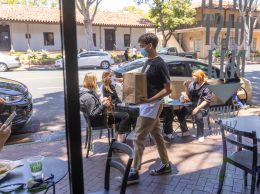
Marsha Bailey
By Marsha Bailey
The Thomas fire and its aftermath have brought catastrophe to our community. The tragic loss of life, homes, farms and businesses has been captured in heartbreaking images. But what is less visible is the loss of livelihood our friends and neighbors are suffering as businesses close — temporarily or permanently — and employees are furloughed or laid off due to lost sales.
The retail, hospitality and food sectors were especially hard hit. Local business owners have told Women’s Economic Ventures they lost between 50 and 75 percent of their customary December sales.
Conventional wisdom says that undercapitalization is the biggest cause of business failure. Reserves of working capital are what enable businesses to survive the predictable ups and downs of seasonal business cycles. The cash that flows into a retail business in December provides the cushion that gets them through the slow months that follow. Small businesses seldom have the resources to sustain them through a disaster like the Thomas fire.
Locally-owned small businesses are what make our downtowns vibrant and unique. Tourists don’t stroll down State Street, Main Street, Coast Village Road or Ojai Avenue in search of another Gap store or a Big Mac. If we want businesses like C’est Cheese, Very Ventura, Maison K, and Paradise Pantry to survive, we need to support them today and every day.
At a personal level, we need to change our shopping habits and think local first. Since 2002, Civic Economics has been conducting groundbreaking research to demonstrate the benefits to local economies of supporting homegrown businesses.
They’ve found that for every $100 in consumer spending with a local firm, $68 remains in the local economy. Only $43 out of $100 spent at a chain firm stays local.
But what’s become known as the “Amazon effect” has moved us beyond the simple binary decision of local vs. chain.
We need to break our Amazon habit.
According to Civic Economics, Amazon sold $7.3 billion in retail goods in California in 2015. That is the equivalent of 5,085 retail storefronts, 17.5 million square feet of commercial space and over $39 million in lost tax revenue to state and local governments. Amazon also operated 7.6 million square feet of distribution space in California, employing roughly 11,289 workers. Even counting all the jobs in Amazon distribution centers, Amazon sales produced a net loss of 32,611 retail jobs in California.
I’m not saying you can’t buy anything from Amazon. I’m asking you to think twice before you do. If you can buy it from a local business like the Home Improvement Center or Chaucer’s Books, do it. Civic Economics found that just a 10 percent increase in local market share makes a big impact. It’s not that hard to shift 10 percent of your spending to local vendors.
But beyond buying local, there are structural and policy issues that must be addressed.
Building permits: Small projects should not be subjected to months of waiting and multiple iterations of corrections to get their plans approved. Every month that passes represents money out of their pockets in rent paid on space that is not producing income. By the time they get their doors open, many new or expanding businesses have exhausted all their cash reserves.
Fee waivers: Local governments must work with businesses to defer, waive or reduce monthly fees for parking and sidewalks for the month of December and perhaps beyond.
Empty storefronts: We may have laughed at New York’s mayoral candidate who started a political party called “The Rent’s Too Damned High,” but the rent’s too damned high. Property owners need to participate in a discussion about the future of our downtowns.
Federal support: Too slow in coming. On Monday — six weeks after the fire started — FEMA finally made the individual declaration necessary for business owners to apply for low-interest disaster loans for economic injury.
State support: The governor has proposed $20 million in the fiscal year 2018-19 budget to support small businesses. This is a welcome first step. But if natural disasters such as the Thomas fire are “the new normal,” as the governor has stated, we need to be thinking about additional strategies to shore up and ensure the viability of our local businesses.
We need to create a working group — a public/private partnership — of local leaders to propose real solutions to the future of our cities and the businesses that keep them vibrant.
I’m willing to step up. Are you?
• Marsha Bailey is the founder and CEO of Women’s Economic Ventures. She was inducted into PCBT’s Business Hall of Fame in 2017.






 Print
Print Email
Email

















